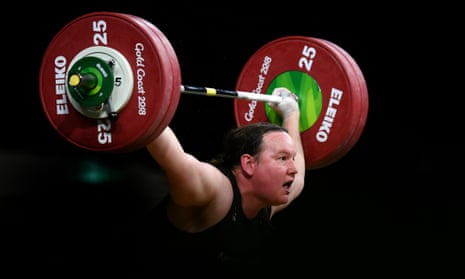New Zealand weightlifter Laurel Hubbard went into the women’s +90kg finals at the Commonwealth Games as favourite, expected not only to win but also perhaps break records.
She finished the first half 7kg ahead of Samoa’s Feagaiga Stowers, but her efforts ended after she injured her elbow striving for a lift of 132kg.
But the eyes the Gold Coast’s Carrara Sport and Leisure Centre were also on Hubbard for another reason, after public challenges to her eligibility because she is a transgender woman who had competed in men’s weightlifting prior to transitioning.
Although no country lodged an official objection, many said they felt it was unfair for Hubbard to be going up against their athletes.
“A man is a man and a woman is a woman and I know a lot of changes have gone through, but in the past Laurel Hubbard used to be a male champion weightlifter,” the Samoa head coach, Jerry Wallwork, told the ABC.
Dr Kieren Keke, the chief de mission for the Nauru team, said the team had not discussed lodging any protest, but he objected in principle.
“I think our view is that it’s a little bit unfair given that she began weightlifting as a man and has that experience in weightlifting as a male, then to carry on as a woman we think is a little bit unfair and gives her an unfair advantage,” Keke said.
Australia’s weightlifting association tried unsuccessfully to have her selection overturned, but on Monday a spokesman for the team said they were just concentrating on the Australian competitor, Deb Lovely-Acason “doing the best she can” at the peak of a successful career.
“Laurel Hubbard has been given the opportunity to represent her country because it was cleared by the Weightlifting Federation, also the Commonwealth Games Association, that she has abided the rules and New Zealand has abided the rules, and her testosterone levels are correct,” he said.
A spokesman for the Cameroon team, Simon Molombe, said they also objected “in principle”. Being transgender, like being gay, is illegal in Cameroon.
“I’m of the opinion that her past has an influence on her present output, and gives her an edge over others,” he said. “I therefore see it as playing without a level ground.”
Hubbard led at the halfway stage of the finals, achieving her first lift of 120kg – 7kg more than Stowers – but then hurt her elbow in her shot at 132kg. After the break it was announced she had declined her lifts and was out.
“At this stage we don’t know the exact details,” Hubbard said afterwards. “It seems likely I have ruptured a ligament. Until they do a scan we won’t know the details.”
She said the support inside the arena spurred her on, even if her afternoon ended in disappointment.
“The Australian crowd was magnificent,” she said. “It felt like just a big embrace. They really made me try to lift my best. I gave it everything and I regret I wasn’t able to make the lift today.
“The Commonwealth Games here are a model for what sport can, and should, be. It’s an incredible environment and an amazing atmosphere. Without any doubt, they have lived up to the mantra of humanity, equality and decency.”
Hubbard passed all requirements to make it into the games and compete in the women’s competition.
Kirsti Miller, a transgender activist, dual-international athlete and educator, said the problem is those requirements can “harm the health of transitioned athletes like myself, and harm the health of XX transition males”.
Miller said the International Olympic Committee guidelines are without proper scientific basis, particularly around testosterone limits. According to Miller the requirement that athletes show levels below a particular limit for 12 months prior to competition is beyond problematic, particularly with older people and those transitioning from a male gender.
“We all transition at a different rate, and a big factor that plays a part in that is your age,” she said. “Twelve months as a policy for everyone is just the most ridiculous thing I’ve ever heard in my life.”
The Commonwealth Games Federation chief executive, David Grevemberg, also noted Hubbard had passed requirements, but said there needed to be further discussion within the weightlifting community about the eligibility of transgender competitors.
“This is something that members have expressed various opinions on and it’s something that the weightlifting community needs to come together and have some robust debate, discussion, on,” Grevemberg said.
“I hope all New Zealanders ... would get behind one of their athletes that has gone through the pathway to achieve greatness, and within the rules of the sport,” he said.
Miller watched Hubbard compete with tears in her eyes, and said she came through “an absolute winner”.
“I just wish I could take some of the pressure off her ... She did everything she had to do to compete today. She gave it her all,” she said.
“I was so pleased with the crowd’s reaction, they were cheering and clapping as loud as for anyone else ... Hopefully Laurel’s given some hope to some young trans kid sitting around the world.”
